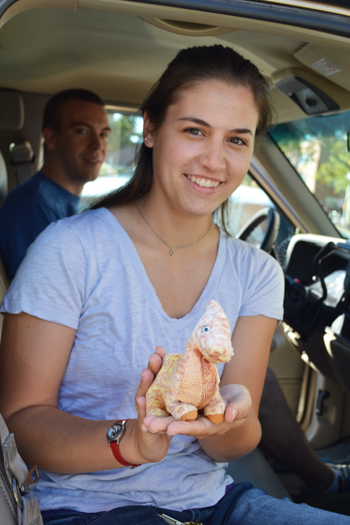
The 2013 Physics Van Coordinators, Scott Luedtke (back) and Katrina Litke, who is holding Hamilton, Vanguard of Physics and Protector of the Van.
Physics Van: A Whole Lot of Fun… Plus, You Get to Blow Stuff Up
October 16, 2013
Kids who attend a Physics Van show will come away with more than just a good time. Though kids can only learn so much science in an hour-long show, they will never forget the physics principles introduced during the Van's entertaining hybrid of slap-stick comedy and scientific wizardry. Something else they'll come away with? Physics can be fun.
Replete with noise, lights, explosions, and plenty of liquid-nitrogen-induced fog reminiscent of old mad-scientist movies, Physics Van, which is completely run by Ilinois Physics students, is a fun, engaging way for local youngsters to learn science.
Have Illinois students involved in the program ever been at a performance, noticed a few kids who were particularly engrossed, and thought to themselves, "Wow! Those kids are going to end up in physics!"? According to Physics Van coordinator Scott Luedtke, it happens all the time, and it's more than just a couple of kids: "I don't know about just a few kids being engaged. It's usually the entire audience. They're all jumping up and down, and we're telling them, 'Quiet down, or else we can't show you anymore cool demos.'"
And it's not just the kids who have fun. Luedtke initially got involved with Physics Van because it sounded like fun. He recalls the previous coordinators' pitch to incoming freshmen. It was something like: "Oh, yea, you get to blow stuff up and explain cool things to kids." Luedtke's response? "Sure, that sounds like fun." That was also his response when, a year later, as a sophomore, he was asked to be a coordinator.
Katrina Litke, co-coordinator with Luedtke for 2013, also reports how much fun it is: "It's helped me have fun with science more. You get to go out and be crazy and be silly."
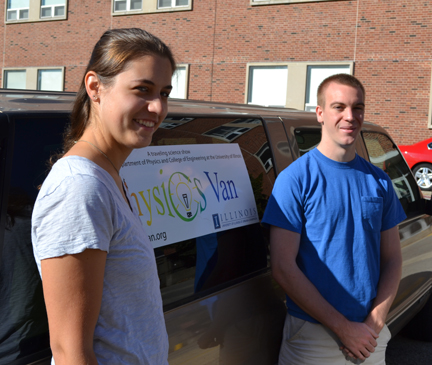
Katrina Litke and Scott Luedtke by the Physics Van, which was purchased through a donation by an Illinois alumnus.
And according to Litke, having fun also seems to be what motivates lots of students to join the Physics Van team…in addition to the ever-popular getting-to-blow-stuff-up. Says Litke: "I think it also helps them to remember why they love physics. If they're in the middle of some really bad equations, they can go out and just have fun, and make things explode, and talk about science and physics."
Research physicist Inga Karliner, who has been a big fan of the Van since its inception, says David Campbell, the department head at the time, originally came up with the idea for the Physics Van; he heard that Purdue had one, and thought Illinois should too. Karliner says of Campbell: "He was a real inspiration for education reform and outreach in the Physics Department." Karliner approached Mats Selen when he first arrived on campus, asking him to start up the program. "I just asked Mats if he wanted to do it," she explains. "That's all I did."
From early on, Selen put his stamp on it. The idea of having students not only do the outreach, but administrate the program, was his. "He figured out he wants the students to own it," says Karliner, "so that from the beginning, the students were designing demos."
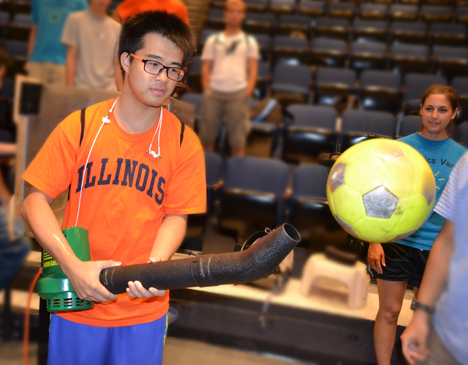
Physics student Zhejian Peng is levitating a soccer ball by blowing air over its top, demonstrating Bernoulli's principle.
They spent about half a year designing the demos. As an added incentive, Selen, the Physics Pied Piper, evidently lured the students there with food. "When they started, he brought pizza," admits Karliner, "which obviously works all the time."
The Physics Van's first performance in the spring of '94 was at the University Primary School at the invitation of head teacher Polly Kemp, who begged Mats to try it out on her kids. Afterwards, Kemp sent Mats and the Physics Van team a glowing letter of thanks.
"You and your students created a wonderful learning environment and intellectually stimulated and involved the children from start to finish."
Kemp also relayed an anecdote about the impact that first show had on one child, which Karliner still hasn't forgotten. "I still remember; she [Kemp] said one of the kids, a girl, came to her—she was writing in her journal—and she asked, 'How do you spell physicist? 'Cause I want to be one when I grow up.'"
Despite the excellent reputation Physics Van currently has in local schools, the program didn't always encounter an open door. In fact, when Mats and Inga chatted with Martin Luther King's principal about doing a show there, according to Inga, "He was extremely reluctant to take an hour of classroom time from all the teachers and risk it with some people who were coming from the Physics Department." Despite his reservations, he reluctantly gave the program a shot.
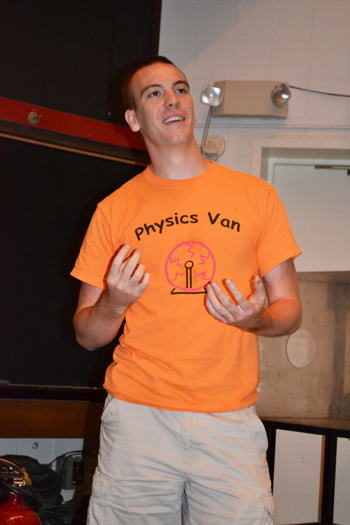
Scott Luedtke has just demonstrated to the trainees how to unsuccsesfully hammer a nail into a board using a banana. A few minutes later, he does it successfully, using a banana that has been frozen in liquid nitrogen.
However, after reading his teachers' responses, such as, "The students loved the noise and the mess," "You showed the magic of Science!" and "Excellent! I think there are probably a few more budding scientists in the world," he changed his tune, entreating, "Please put us back on your list for another program next year."
Has the Physics Van show changed much over the years? Says Karliner, "It evolves…Every coordinator has different strengths, so they add different things to it."
Luedtke says the team keeps the routines fresh by improvising: "Well, the physics show is pretty well established and has been around for 20 years, so most of our demos are pretty well set, and we have equipment for that. There is a lot of improvisation in the way we present the demos…We will also play off each other."
So, besides having fun, what are some benefits for Illinois students who participate in the outreach? Karliner reports that once students get involved, they usually stay involved during their entire time at Illinois. Why? She says it gives them a sense of belonging.
"They like being in the group," says Karliner. "It's a huge investment. Engineering is a big school. And physics itself is really big; we have 600 majors. So they have a home."
According to Luedtke, one of the benefits is giving physics students practice communicating at a level a layperson—or a third grader—could understand. "I suppose the most tangible impact is for students who want to become physics teachers. It gives them a chance to interact with elementary age students so they can learn how to explain things much below their level—so to the general public instead of just to other physicists."
In fact, Luedtke himself has grown in this area: "At the very least, it's helped me be mindful of jargon, because in physics we use all kinds of jargon which has very specific meaning, and it's very useful to use the jargon when you're around people who know what it means. Third graders have no idea what it means at all, so you have to explain things in its most basic terms. So it just helps me explain anything that I do to almost any level of people."
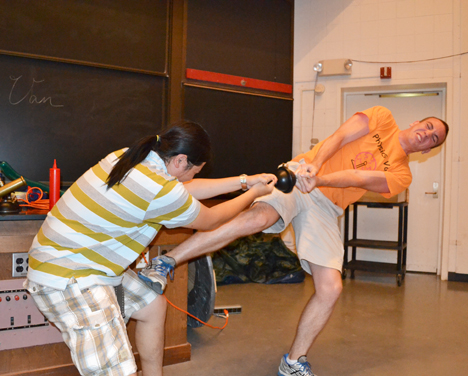
In one of Physics Van's slapstick routines, Conan Huang and Scott Luedtke strain but are unable to pull apart a pair of evacuated Magdeburg hemispheres.
Litke adds that it's increased her confidence in speaking: "I think it has helped make me more confident and helped me be more comfortable speaking in front of people in particular crowds, though it's a lot easier to speak to a room full of kids than it is to speak to a room full of your peers or professors."
In showing youngsters how much fun Physics can be, students who do outreach via Physics Van have a not-so-ulterior motive: they hope some kids might end up in STEM.
"The goal is that kids will get more excited about science and see it as something that can actually be a lot of fun," says Luedtke..."Stuff can actually explode sometimes, and there are also a lot of cool interesting effects of certain physical laws. We hope to show kids about that so they get excited and will eventually choose a STEM career."
And it appears to be working. Another take-away for youngsters is that a few might just study physics at Illinois once they've grown up. Mats Selen recently informally polled students in his introductory physics lectures, and at least 20 students indicated that they had seen Physics Van as youngsters.
Another probability associated with participating in the outreach program? Like the Physics Van skit about positive and negative charges being attracted to one another, in the past there has evidently been a lot of electricity between a guy and a gal who are co-leaders. According to Karliner, at least twice now in the 20-year history of Physics Van, the co-leaders have ended up getting married.
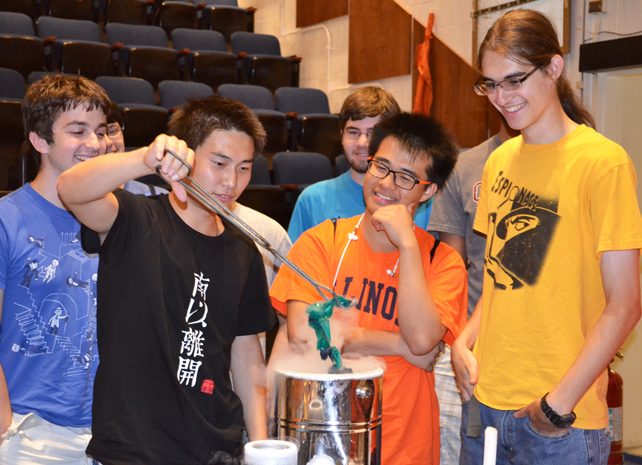
Physics Van trainee has just successfully performed a demo as other trainees cheer him on. In this demo, a balloon is placed in liquid nitrogen, which causes the air in the balloon to contract, making the balloon shrivel.
When apprised of the precedent of co-leaders hooking up, Scott Luedtke and Katrina Litke, who currently co-lead the outreach program, both indicated they were not aware of this fact. Luedtke's response: "Awkward."
For the Physics Van coordinators, what's the bottom line? "You get to freeze stuff, blow stuff up, smash stuff, ride hover boards, and get kids excited about science," Luedtke says. Adds Litke: "Physics Van is awesome."
Story and photographs by Elizabeth Innes, Communications Specialist, I-STEM Education Initiative.
More: K-6 Outreach, Physics, 2013
For more on the Physics Van, see the I-STEM article, Mats Selen–Changing the Way Physics is Taught.
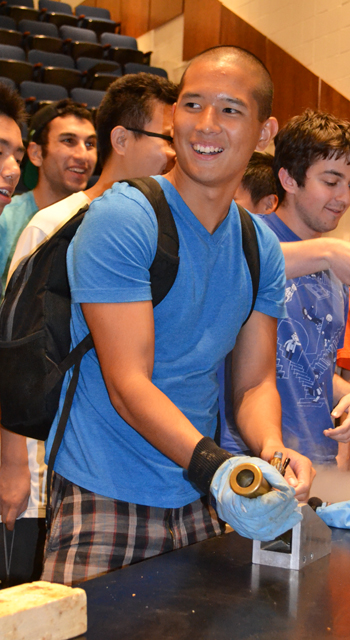
Physics Van volunteer Joshua Lanzona has just successfully completed a demo where a cork is shot from a cannon using liquid nitrogen.
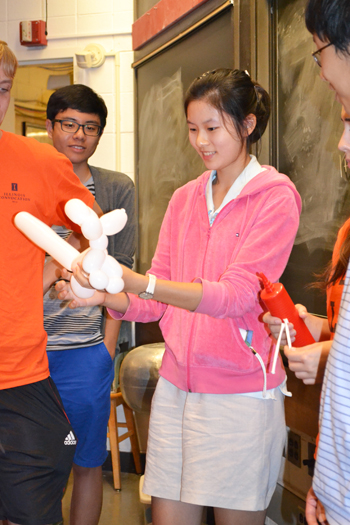
Estelle Kao creates balloon animals for trainees to dip into liquid nitrogen.













.jpg)
















